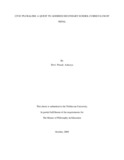Please use this identifier to cite or link to this item:
https://elibrary.tucl.edu.np/handle/123456789/1349Full metadata record
| DC Field | Value | Language |
|---|---|---|
| dc.contributor.author | Acharya, Devi Prasad | - |
| dc.date.accessioned | 2021-07-22T08:52:35Z | - |
| dc.date.available | 2021-07-22T08:52:35Z | - |
| dc.date.issued | 2009 | - |
| dc.identifier.uri | http://elibrary.tucl.edu.np/handle/123456789/1349 | - |
| dc.description.abstract | The main purpose of this study was to find out the perceptions of different ethnics groups of people on civic education, civic knowledge and civic values and its representation in the secondary school curriculum of Nepal. This study also identifies how far the Nepalese secondary school level curriculum has given place to civic ducation. This study followed qualitative research methodology to identify the perceptions of different individuals on civic education and its knowledge and values. The field study was conducted in Lalitpur district Saibu VDC word no. 6, 7 Bhaisepati. The research participants were the people from three ethnic groups, school teachers and SLC graduates. For the collection of information in-depth interviews, discussion and observation were conducted. Document study was also done to find out the situation of civic components in secondary level school curriculum. The information was collected than triangulated and interpreted linking with different theories. The findings indicate that the secondary school curriculum has not been able to address the cultural values of different ethnic groups of people. Document study shows that less value has been given to civic education in different periods of time. Teachers and students claimed that there are not enough civic contents and pedagogical processes in the secondary school level curriculum. Ethnic civic cultural values are largely ignored. Civic education has got less priority in secondary school level curriculum. In this context, it is there fore concluded that there is need to address ethnic civic values and socio cultural orientations in school level curriculum as well as contextualizing at the local attitudes and constitutional knowledge etc should be incorporated in social studies and other subjects like EPH, Nepali and English subjects also in secondary level school curriculum. level. Civic components such as civic knowledge, democratic culture, tolerance, cooperative | en_US |
| dc.language.iso | en_US | en_US |
| dc.publisher | Faculty of Education | en_US |
| dc.subject | secondary school | en_US |
| dc.subject | students | en_US |
| dc.subject | perception | en_US |
| dc.title | Civic Pluralism: A Quest to Address Secondary School Curriculum of Nepal | en_US |
| dc.type | Thesis | en_US |
| local.institute.title | Faculty of Education | en_US |
| local.academic.level | M.Phil. | en_US |
| Appears in Collections: | English Language Education | |
Files in This Item:
| File | Description | Size | Format | |
|---|---|---|---|---|
| Full Thesis.pdf | 238.23 kB | Adobe PDF |  View/Open |
Items in DSpace are protected by copyright, with all rights reserved, unless otherwise indicated.
